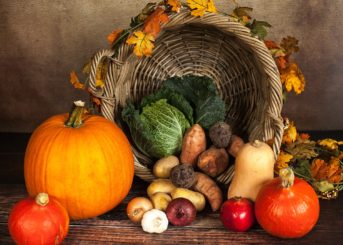
Editor’s note: Next week, many Americans will gather together to celebrate Thanksgiving. This holiday has become as much about food as it is about giving thanks. In preparation, we are reprinting some thoughts about food and justice from our archives.
Food justice is a topic inextricably linked to the theme of Rachel Marie Stone’s new book, Eat With Joy: Redeeming God’s Gift of Food, which explores the journey towards “eating like a Christian.” Stone approaches food holistically, tackling issues such as the health and perception of our bodies, ecological concerns and sustainability, care for our neighbor, and the spiritual practices related to food and community. The book’s chapters focus on viewing food as a gift from God, the importance of giving food to others, the significance of shared meals, how to view food as a part of a picture of sustainability, how to glorify God in cooking and eating, and, finally, how to wrap it all up in joy.
It is a spiritual practice to acknowledge with gratefulness the gift of food and to enjoy the act of partaking of its plethora of tastes and textures.
It is a spiritual practice to acknowledge with gratefulness the gift of food and to enjoy the act of partaking of its plethora of tastes and textures. Stone proposes that the practice of eating with joy be matched with a “redemptive” eating focus that seeks to acknowledge the way our food choices impact the earth and the food available to others. Examples such as knowing the farmers who produce your food, opposing political and profit-driven plans that actually reduce the amount of food available to hungry people, and working to minimize the amount of food waste are all practical steps towards becoming a “redemptive eater.”
As someone who has long been interested in the often volatile relationship humans have with food and the way it impacts how we see ourselves and those around us, I had been looking forward to reading Stone’s book. I was not disappointed. She does a good job of talking about our bodies and health without falling into the trap of advocating a certain “perfect” body type. This book is also, thankfully, not a “devotional diet” book. I was happy to see her acknowledgement early in the book that the church as a whole has done little to combat (and at times has enabled) the damaging lies the media tells us about food’s relationship to our body.
One of the things I appreciated the most about the book is the inclusion of prayers and “points for action” at the end of each chapter. Stone provides tools for meaningful ways to integrate eating with joy into a daily practice. Especially refreshing is her honesty throughout the book in acknowledging that to eat with joy with a mind towards justice is not easy. Once you start looking into the food injustice in the world, it seems impossible to remove yourself entirely from complicity. The action points and blessings are starting points to work towards justice and joy in regards to food.
…to eat with joy with a mind towards justice is not easy.
It would be easy to say that Stone’s book is a great read for anyone who eats; however, in an effort to narrow the audience a bit, I will say that it is a book beneficial to people interested in the way we eat and how we eat. Those who have a history of navigating the waters of body image and its connection to food and Christian faith will find the book especially meaningful.
 J. Nicole Morgan lives near Atlanta, where she works for a non-profit trying to make the world a bit more just and peaceful. She loves to spend her free time thrifting, sewing, and hanging out with her nieces and nephew. She is the author of Fat and Faithful: Learning to Love Our Bodies, Our Neighbors, and Ourselves.
J. Nicole Morgan lives near Atlanta, where she works for a non-profit trying to make the world a bit more just and peaceful. She loves to spend her free time thrifting, sewing, and hanging out with her nieces and nephew. She is the author of Fat and Faithful: Learning to Love Our Bodies, Our Neighbors, and Ourselves.



4 Responses
Why can’t I print this article and other articles on this website?
Mmmm – we worry a little about using too much paper, but let me see if there’s something quick we can do to make printing a little easier. In the meantime, you’d need to copy/paste into a new document, if you didn’t want the images to print.